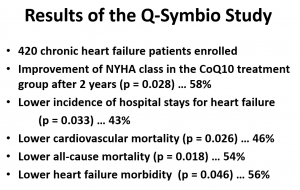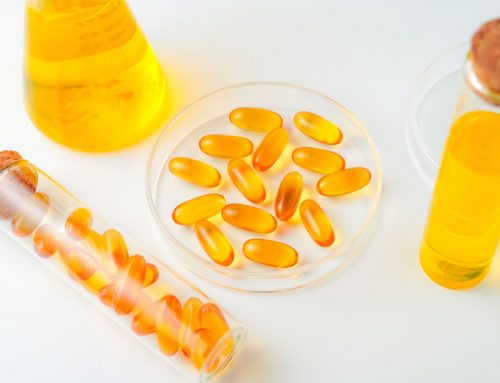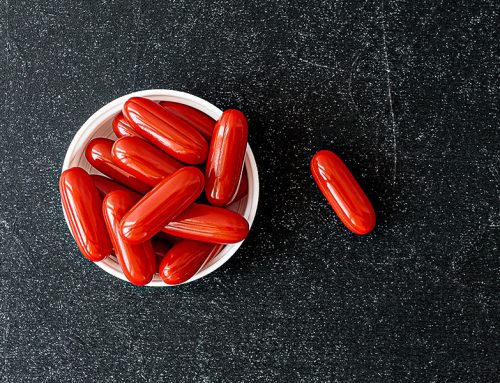
Evidence from randomized controlled trials like the Q-Symbio study show the efficacy of Coenzyme Q10 adjuvant treatment in improving the symptoms and survival of chronic heart failure patients. Illustration courtesy of Dr. William Judy, SIBR Research Institute.
For 30-plus years now, bio-medical researchers have investigated and documented the functions of Coenzyme Q10 supplementation in the human body:
- An essential role in cellular production of ATP energy [Littarru 2007]
- An important antioxidant role preventing the oxidation of proteins, lipids, and DNA [Littarru 2007]
- A role in the enhancement of endothelial function [Littarru 2011]
- A beneficial role in the expression of genes involved in human cell metabolism, signaling, and transport [Garrido-Maraver]
Moreover, the scientific documentation shows that Coenzyme Q10 supplements are safe, are well-tolerated, and are effective as adjunctive treatments in diseases involving high cellular and tissue demands for energy and in diseases involving oxidative stress and oxidative damage [Garrido-Maraver].
Absorption and Bio-Availability of Coenzyme Q10
As we get older, our bodies produce less Coenzyme Q10 [Kalén]. It is not realistic to make up the difference in the diet [Judy]. Supplementation is necessary.
- Intestinal absorption of Coenzyme Q10 supplements depends very much on the type of supplement and the formulation of the supplement [Weis].
- Intestinal absorption of Coenzyme Q10 supplements is improved if the Coenzyme Q10 supplements are taken together with meals containing some fat. Two times 100 milligrams of Coenzyme Q10 taken separately will give better absorption than 200 milligrams taken once per day [Singh].
- Coenzyme Q10 absorbed from supplements shows up first in the plasma lipoproteins and in the liver. Higher levels of Coenzyme Q10 supplementation are required for increased uptake in the heart and skeletal muscle cells [Garrido-Maraver].

Dr. William V. Judy, founder and president of the SIBR Research Institute, has done studies that show that the ubiquinol form of Coenzyme Q10, taken as a supplement, is converted to the ubiquinone form in the stomach and the small intestine before it reaches the absorption cells.
Coenzyme Q10 dosage guidelines
Current recommendations are that Coenzyme Q10 supplementation is safe and well-tolerated for adults up to 1200 milligrams per day and up to 10 milligrams per kilogram of body weight per day for children [Garrido-Maraver].
Please note that the dosages used in the Q-Symbio study of chronic heart failure patients [Mortensen] and in the KiSel-10 study of live-at-home elderly citizens [Alehagen] were 300 milligrams and 200 milligrams taken three times and two times daily, respectively.
It does not seem necessary to take Coenzyme Q10 supplements in the relatively new and untested ubiquinol (reduced Coenzyme Q10) form. Coenzyme Q10 molecules are redox molecules. Coenzyme Q10 supplements in the well-documented ubiquinone form will provide molecules to be reduced [Judy].
Clinical applications of Coenzyme Q10 supplements
Coenzyme Q10 supplementation and chronic heart failure
Research has shown a strong association between low plasma and tissue Coenzyme Q10 concentrations and the risk of chronic heart failure [Folkers].
Several randomized controlled trials have shown significant improvement in the symptoms and survival of chronic heart failure patients administered Coenzyme Q10 as an adjunctive treatment [Morisco; Munkholm; Mortensen].
The mechanisms of action underlying the protective role of Coenzyme Q10 supplementation in heart failure are threefold:
- Improved cellular energy production [Mortensen]
- Improved antioxidant defense [Mortensen]
- Enhanced endothelial function [Littarru 2011]
Coenzyme Q10 supplementation and high blood pressure
Higher concentrations of plasma Coenzyme Q10 are associated with lower blood pressure [Rosenfeldt]. Adding Coenzyme Q10 adjunctive treatment to conventional high blood pressure treatment seems reasonable. It may be that Coenzyme Q10 adjunctive treatment can reduce the need for patients to take multiple high blood pressure medications [Garrido-Maraver].
Coenzyme Q10 supplementation for patients on statin medications
Statin medications work by blocking the action of the HMG-Coenzyme A reductase enzyme. Unfortunately, inhibition of this biological pathway blocks not only the body’s synthesis of cholesterol but also blocks the body’s synthesis of Coenzyme Q10. The result is, almost inevitably, reduced energy and increased fatigue [Golomb].
In calling for a re-evaluation of the guidelines for the use of statin medications, Dr. Okuyama and Dr. Langsjoen have suggested pharmacological mechanisms by which statin medications may be stimulating atherosclerosis and heart failure while inhibiting the synthesis of cholesterol. Statins, they say, have the following harmful effects:
- Deplete the body’s supply of Coenzyme Q10
- Inhibit the synthesis of vitamin K2
- Inhibit the biosynthesis of selenium containing proteins (including the antioxidant glutathione peroxidase enzymes)
The logical conclusion at this point is that patients taking a statin medication will want to ask their cardiologists about the documented need for a Coenzyme Q10 supplement [Garrido-Maraver].
Coenzyme Q10 and diabetes
Coenzyme Q10 levels are often decreased in type-2 diabetes patients. The decrease in Coenzyme Q10 levels can be reversed by supplementation [Garrido-Maraver].
In randomized controlled trials enrolling diabetes patients, Coenzyme Q10 supplementation was associated with the following health outcomes:
- increased plasma Coenzyme Q10 levels
- improved endothelial function in the brachial artery (the major blood vessel of the upper arm)
- decreased systolic and diastolic blood pressure
- decreased HbA1C levels (HbA1C = a measure of glycated haemoglobin that gives an estimate of what the average blood sugar levels have been over a period) [Garrido-Maraver]
Coenzyme Q10 and cancer
Low Coenzyme Q10 levels have been observed in the following types of cancer:
- patients with breast cancer
- patients with lung cancer
- patients with cancer of the pancreas
- patients with melanoma [Rusciani]
- patients with cervical intraepithelial neoplasia and cervical cancer [Palan]
Coenzyme Q10 supplementation may protect against the progression of cancer by enhancing immune system function and by protecting against oxidative damage [Garrido-Maraver].
Coenzyme Q10 and cancer chemotherapy
The chemotherapy drug Adriamycin® depletes the body’s supply of Coenzyme Q10 and, in high cumulative dosages, leads to cardio-toxicity. Concomitant Coenzyme Q10 supplementation is necessary to prevent damage to the heart muscle [Garrido-Maraver].
Conclusion: Coenzyme Q10 supplementation safe and effective
In this article, I have relied heavily on the work of Dr. Juan Garrido-Maraver and his colleagues. Dr. Garrido-Maraver has documented the safety and the efficacy of Coenzyme Q10 as adjuvant therapy for the following diseases:
- Chronic heart failure
- Hypertension
- Atherosclerosis treated with statin medications
- Diabetes
- Several forms of cancer
Read our key article about CoQ10 and cardiovascular health in elderly people
Read our key article on CoQ10 as adjuvant therapy for heart failure
Sources
Alehagen, U., Johansson, P., Björnstedt, M., Rosén, A., & Dahlström, U. (2013). Cardiovascular mortality and N-terminal-proBNP reduced after combined selenium and coenzyme Q10 supplementation: a 5-year prospective randomized double-blind placebo-controlled trial among elderly Swedish citizens. International Journal of Cardiology, 167(5), 1860-1866.
Folkers, K., Vadhanavikit, S., & Mortensen, S. A. (1985). Biochemical rationale and myocardial tissue data on the effective therapy of cardiomyopathy with Coenzyme Q10. Proceedings of The National Academy of Sciences of The United States of America, 82(3), 901-904.
Garrido-Maraver, J., Cordero, M. D., Oropesa-Ávila, M., Fernández Vega, A., de la Mata, M., Delgado Pavón, A., & … Sánchez-Alcázar, J. A. (2014). Coenzyme Q10 therapy. Molecular Syndromology, 5(3-4), 187-197. doi:10.1159/000360101
Golomb, B. A., Evans, M. A., Dimsdale, J. E., & White, H. L. (2012). Effects of statins on energy and fatigue with exertion: results from a randomized controlled trial. Archives of Internal Medicine, 172(15), 1180-1182. doi:10.1001/archinternmed.2012.2171
Judy, W. V., Stogsdill, W. W., Judy, D. S., & Judy, J. S. (2007). Coenzyme Q10: Facts or Fabrications? Natural Products Insider. Retrieved from http://www.zmc-usa.com/docs/CoQ10_Facts_or_Fabrications.pdf.
Judy, W. V. (2017). Private communication.
Kalen A, Appelkvist EL, Dallner G. (1989). Age-related changes in the lipid compositions of rat and human tissues. Lipids, 1989;24(7):579–584.
Littarru, G. P., & Tiano, L. (2007). Bioenergetic and antioxidant properties of coenzyme Q10: recent developments. Molecular Biotechnology, 37(1), 31-37.
Littarru, G. P., Tiano, L., Belardinelli, R., & Watts, G. F. (2011). Coenzyme Q10, endothelial function, and cardiovascular disease. Biofactors (Oxford, England), 37(5), 366-373.
Morisco, C., Trimarco, B., & Condorelli, M. (1993). Effect of coenzyme Q10 therapy in patients with congestive heart failure: a long-term multicenter randomized study. The Clinical Investigator, 71(8 Suppl), S134-S136.
Mortensen, S. A., Rosenfeldt, F., Kumar, A., Dolliner, P., Filipiak, K. J., Pella, D., & … Littarru, G. P. (2014). The effect of coenzyme Q10 on morbidity and mortality in chronic heart failure: results from Q-SYMBIO: a randomized double-blind trial. JACC. Heart Failure, 2(6), 641-649.
Munkholm, H., Hansen, H. H., & Rasmussen, K. (1999). Coenzyme Q10 treatment in serious heart failure. Biofactors
(Oxford, England), 9(2-4), 285-289.
Okuyama, H., Langsjoen, P. H., Hamazaki, T., Ogushi, Y., Hama, R., Kobayashi, T., & Uchino, H. (2015). Statins stimulate atherosclerosis and heart failure: pharmacological mechanisms. Expert Review of Clinical Pharmacology, 8(2), 189-199.
Palan, P. R., Mikhail, M. S., Shaban, D. W., & Romney, S. L. (2003). Plasma concentrations of coenzyme Q10 and tocopherols in cervical intraepithelial neoplasia and cervical cancer. European Journal of Cancer Prevention, 12(4), 321-326.
Rosenfeldt, F. L., Haas, S. J., Krum, H., Hadj, A., Ng, K., Leong, J., & Watts, G. F. (2007). Coenzyme Q10 in the treatment of hypertension: a meta-analysis of the clinical trials. Journal of Human Hypertension, 21(4), 297-306.
Rusciani, L., Proietti, I., Rusciani, A., Paradisi, A., Sbordoni, G., Alfano, C., & … Lippa, S. (2006). Low plasma Coenzyme Q10 levels as an independent prognostic factor for melanoma progression. Journal of The American Academy of Dermatology, 54(2), 234-241.
Singh, R.B., Niaz, M.A., Kumar, A., Sindberg, C.D., Moesgaard, S., & Littarru, G.P. (2005). Effect on absorption and oxidative stress of different oral Coenzyme Q10 dosages and intake strategy in healthy men. Biofactors, 25(1-4):219-24.
Weis, M., Mortensen, S.A., Rassing, M.R., Møller-Sonnergaard, J., et al. (1994). Bioavailability of four oral Coenzyme Q10 formulations in healthy volunteers. Mol Aspects Med., 15 Suppl:s273-80.
The information presented in this review article is not intended as medical advice and should not be used as such.









Leave A Comment